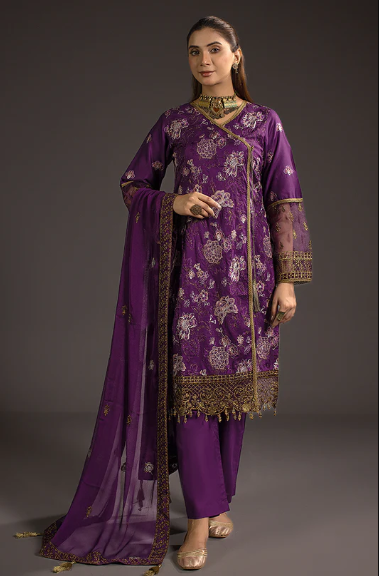In Pakistan, formal wear for women reflects a beautiful fusion of traditional aesthetics and modern sophistication. Pakistani formal dresses are celebrated for their intricate embroidery, luxurious fabrics, and vibrant colors, capturing the essence of the country’s cultural heritage. Whether for weddings, formal gatherings, or festive celebrations, these dresses make a statement with their timeless elegance. This article explores the diverse range of formal dresses for women in Pakistan, highlighting key styles, trends, and tips for choosing the perfect outfit.
1. Anarkali Suits: Timelessly Elegant
Anarkali suits have been a popular choice for formal wear in Pakistan for centuries. Characterized by a fitted bodice and a flowing skirt, the Anarkali dress exudes grace and sophistication. Anarkalis often feature intricate embroidery, zari (gold or silver thread work), and embellishments on the neckline, sleeves, and hemline.
Styles within Anarkalis:
- Floor-length Anarkalis – Perfect for weddings and grand events, these can be heavily embroidered and paired with a contrasting dupatta (scarf).
- Short Anarkalis with Palazzo Pants – A modern twist that pairs a short, flared top with wide-legged palazzos, giving a contemporary edge to this classic style.
2. Lehenga Choli: Traditional Glamour
The lehenga choli is another formal outfit that holds a special place in Pakistani fashion. This ensemble consists of a richly embroidered skirt (lehenga), a blouse (choli), and a dupatta. Lehengas are typically worn at weddings, receptions, and formal parties, with fabrics like silk, velvet, and organza adding a royal touch.
Popular lehenga styles include:
- Fish-Cut Lehengas – Fitted till the knees and flaring out at the hem, perfect for creating a dramatic silhouette.
- A-line Lehengas – Classic and versatile, these suits most body types and are often embellished with heavy embroidery.
3. Shararas and Ghararas: Vintage Appeal
Shararas and ghararas are traditional outfits that have made a strong comeback in recent years. Shararas consist of flared pants, a long or short kameez (tunic), and a dupatta. Ghararas, on the other hand, have a tighter fit around the thighs with a sudden flare at the knees, creating a distinctive silhouette.
These styles often feature beautiful detailing and are ideal for festive occasions like Eid, weddings, and engagement parties. They’re typically made with rich fabrics like silk, brocade, and velvet, paired with heavy zardozi (metallic embroidery) and mirror work.
4. Maxi Dresses and Gowns: A Modern Fusion
Pakistani designers have embraced the global trend of maxi dresses and gowns, infusing them with local artistry. These floor-length dresses are ideal for women who prefer a more modest yet stylish look. Pakistani maxi dresses often come with embroidered bodices, sheer overlays, and delicate embellishments.
Variations include:
- A-line Gowns – Simple and elegant, often with lace or sequin detailing.
- Ballgown Silhouettes – Perfect for formal dinners and wedding receptions, these gowns provide a fairy-tale look with flowing layers and embellishments.
5. Angrakha Style Outfits: Traditional with a Twist
The Angrakha style, with its wrap-around design, has a distinctly ethnic appeal and is widely used in Pakistani formal wear. Angrakha dresses feature overlapping layers tied at the side and are usually decorated with tassels, embroidery, and mirror work. This style is often paired with straight pants or churidars, making it ideal for both casual and formal settings.
6. Pant Suits and Long Shirts with Trousers: Contemporary Chic
For those who prefer a blend of modern and traditional, pant suits and long shirts paired with trousers are popular choices. These outfits come in various styles, from straight-cut long shirts to asymmetrical cuts, often paired with slim or wide-legged pants. Embroidery on the neckline, sleeves, and hem adds sophistication, while simpler designs in solid colors are ideal for formal dinners and corporate events.
Fabrics and Embellishments in Pakistani Formal Wear
Pakistani formal dresses are crafted from high-quality fabrics that add luxury to the designs. Popular choices include:
- Silk and Velvet: Ideal for winter events, these fabrics give a rich texture and pair beautifully with embroidery.
- Chiffon and Georgette: Light and flowy, perfect for summer, and often used for creating delicate and airy silhouettes.
- Organza and Net: Frequently used for dupattas and overlays, these fabrics add an ethereal touch to formal dresses.
Embellishments are a hallmark of Pakistani formal wear, with styles that range from traditional to contemporary:
- Zardozi and Tilla Work: Metallic threadwork that adds a royal appeal to any outfit.
- Mirror and Sequins Work: Adds sparkle, commonly used in festive attire.
- Appliqué and Patchwork: Ideal for creating designs that are bold and visually appealing.
Tips for Choosing the Perfect Formal Dress
When selecting a formal dress, consider these tips to ensure the outfit complements both the occasion and your personal style:
- Know the Event Type: For weddings, go for elaborate styles like lehengas or shararas. For formal dinners, a simpler, elegant maxi dress or pant suit can work well.
- Choose the Right Fit: Select a style that suits your body shape. Anarkalis and A-line gowns are flattering on most body types, while fish-cut lehengas look great on taller frames.
- Focus on Fabric and Season: Choose heavier fabrics like velvet for winter events and lighter options like chiffon or silk for summer.
- Color and Embroidery: Select colors and embroidery that complement your skin tone and the event. Bright colors and gold accents work well for festive gatherings, while pastel hues and subtle embroidery can be ideal for more intimate events.
Conclusion
Formal dresses for women in Pakistan reflect a unique blend of traditional and modern fashion, allowing every woman to express her individual style with elegance. Whether you prefer the timeless charm of an Anarkali, the glamor of a lehenga, or the sophistication of a maxi dress, there’s a perfect choice for every occasion. Pakistani formal wear not only showcases exquisite craftsmanship but also celebrates the rich cultural heritage of the country, making each outfit a work of art.
